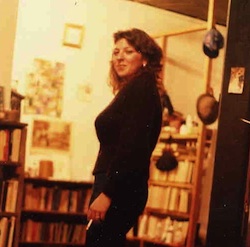
The conversion of one of the most famous saints of all—St. Paul—came about when, as a rabid opponent of the early Christians bent on the new religion’s destruction, he heard a voice saying, “Saul, Saul, why are you persecuting me?”
In the fall of 1986, I spent 30 days at Hazelden, an addiction treatment center in rural Minnesota. Hiking trails meandered through the woods. The trees were turning color. One morning I crept out for a walk just past dawn. Not another soul stirred. I came upon a pond and, through the mist, saw a blue heron, standing stock-still, noble head erect. I saw the heron and the heron saw me.
It was a moment of heart-stopping beauty, of liminal space and time, and in my memory it has attained the level of myth. Later I recognized its specific quality in the Song of Songs:
O my dove, in the clefts of the rock,
in the covert of the cliff,
let me see your face,
let me hear your voice,
for your voice is sweet,
and your face is lovely…
During all those years that I’d been drinking morning Sea Breezes in Boston’s Sullivan’s Tap, a parallel world had been breathing, suffering and praising God.
Though I never drank again, it would be several months before I became clean and sober. Many years would pass before I discovered Christ, whose “law” is love, and more years after that before I saw that death and resurrection are the dynamic of all creation and I came into the Catholic Church. But I can mark my conversion—in the deepest sense, my sobriety—from that moment in 1986. In a most mysterious way, for me the heron was Christ, saying, “Heather, Heather, why are you persecuting me?”
My experience with the heron wasn’t a white-light one. It was a door opening onto a very long and slow spiritual awakening.
On the road to Damascus, St. Paul fell off his horse and was temporarily struck blind—a violent conversion—but Christ has come to me in the form of a lamb, a dove and a heron. That’s not to say he’s always gentle. But he’s often gentlest when I’ve been doing terrible violence to myself and others. Christ doesn’t convert with the worldly weapons of peer pressure, ridicule and self-blame that can do more damage than any gun. He says, “Look at these blue-gray feathers.” He says, “Isn’t it lovely to be still and listen to the frogs?” He looks me in the eyes with love and says, “Why are you persecuting me?”
For 20 years the obsession to drink—Where can I get more? What lies will I have to tell? Who can I use?—had held me in its grip. But sometime during my month in treatment the obsession to drink was lifted. I died to my identity as a drunk: as a person who had to drink, whose god was booze.
To be forgiven when I knew I didn’t “deserve” to be forgiven was radically transformative in a way that actual violence never could have been. But to be forgiven did another kind of violence: to my lifelong tit-for-tat notion of crime and punishment, to my conviction that love had to be earned, to the rock-bottom fear that I was bad.
Eye to eye with that bird, I “saw” that my offense didn’t lie, as I’d always thought, in being a drunk. Nobody asks to have alcoholism. My offense lay in the fact that the things I’d done under the influence of booze were against love, truth and beauty.
My experience with the heron wasn’t a white-light one. It was a door opening onto what has proved to be a very long and slow spiritual awakening of, as William James put it, “the educational variety.” How often I’ve forgotten the heron. How often I’ve been harsh, rageful, intolerant, unfaithful, unkind and just plain wrong.
When that happens, I’m struck blind for a few hours, days or even months. Often a long time passes before I see that once again, I’ve been persecuting Christ.
This Easter morning, once again, I’ll go to Mass. Once again, I’ll kneel, gaze at Christ nailed to the Cross and remember that for a drunk to hit bottom is to undergo a psychic crucifixion of the first order. Once again, the bare altar, the statues that have been shrouded for the past seven weeks, will have given way to an explosion of flowers, springtime, metaphorical light. Once again, I’ll think of the heron, harbinger of the first tentative hope that maybe I wouldn’t have to drink myself to death after all—that maybe there was a new life for me.
Afterward, I’ll eat a ton of sugar, which I’ve been fasting from during Lent. And then I’ll go hang out with my fellow sober alkies and addicts for an hour, because in 25 years, my love for them has never palled. For all my ongoing suffering, and the suffering of the world, I get to live in an unlikely and ongoing resurrection.
But what’s remarkable about St. Paul isn’t that he had a white-light experience. What’s remarkable is that he continued to trudge the path for all the remaining years of his life.
Heather King is an ex-barfly, an ex-lawyer and a Catholic convert with three memoirs: Parched; Redeemed; and Shirt of Flame: A Year with St. Thérèse of Lisieux. She lives in Los Angeles and blogs at shirtofflame.blogspot.com. Visit her website at heather-king.com.